Tips On Pest-Proofing Your Home For The New England Winter
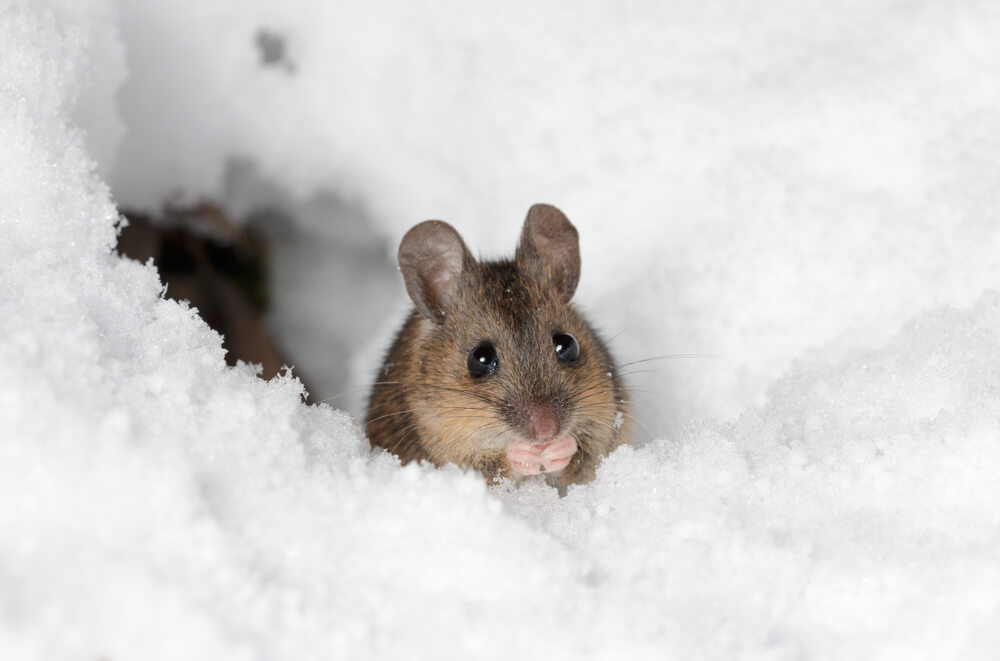
The cold wintertime in New England can drive a wide range of pests into your home that are seeking shelter. Some of the most common winter pests in New England and the surrounding regions are rodents, carpenter ants, cockroaches, stink bugs, ladybugs, bed bugs, earwigs, and more. In this article, we’ll give you some tips on how you can prepare your home for the wintertime in order to prevent pest infestations from rodents, insects, and more! If you have any questions about pest prevention or are currently experiencing a problem with any kind of pest at your northeastern Massachusetts or southern New Hampshire home, please contact our team at Absolut Pest Control today for a free pest control estimate!
Seal Gaps & Cracks Around The Exterior Of Your Home
One of the best ways to prevent rodent and insect infestations in your home during the wintertime is to ensure that these pests can never enter the house in the first place! To do this, you should perform a thorough inspection of your house’s foundation, doors, windows, and siding. If you notice any cracks or gaps anywhere on the exterior of your home, you should be sure to seal them up in order to prevent pests from entering through them. Even if the crack or gap seems insignificant, they should still be sealed, as adult mice can squeeze through spaces that are only about the size of a dime. In order to seal off cracks and gaps, you can use screens, caulking, spray foam, steel wool, and more.
Landscaping Around Your House
Another great way to prevent pest infestations during the wintertime is to keep up with the landscaping around the exterior of your house. You should be sure that any tree branches around your house are trimmed back to at least 10 feet from your roof, as they can act as a bridge for insects and rodents. Additionally, piles of firewood should be placed at least 5 feet from your home’s walls, as pests living in these stacks could otherwise gain easier entry into your house. Finally, be sure to properly deal with the leaves that fall from the trees around your house, as pests often live and hide underneath debris. Rake your yard regularly to keep up with leaves and clean out your gutters!
Properly Dispose Of Garbage
One more way to prevent pest infestations this winter is to be vigilant about the way you store and dispose of your trash. Improper garbage storage is one of the most surefire ways to attract pests to your home, especially during the wintertime when pests’ typical food sources are more scarce. Be sure that your trash and recycling bins have tight fitting lids that are being utilized while the trash is still in your home and while it’s on the curb awaiting pickup, as rodents and small mammals like raccoons may try to break into your trash cans to find an easy meal. You should also be sure to regularly clean your trash cabinets in order to pick up any spills and crumbs that may be attracting ants, mice, and other pests!
Contact Absolut Pest Control!
If you have any questions about preventing pest infestations in the wintertime or are currently experiencing a pest problem at your Massachusetts or New Hampshire home, please contact our team at Absolut Pest Control! We provide home and business owners in the region with a wide range of pest removal & extermination services at affordable prices! Contact us today to get a free estimate by giving us a call at (978) 388-4589 or by filling out the contact form on our website!
Everything You Need To Know About June Bugs
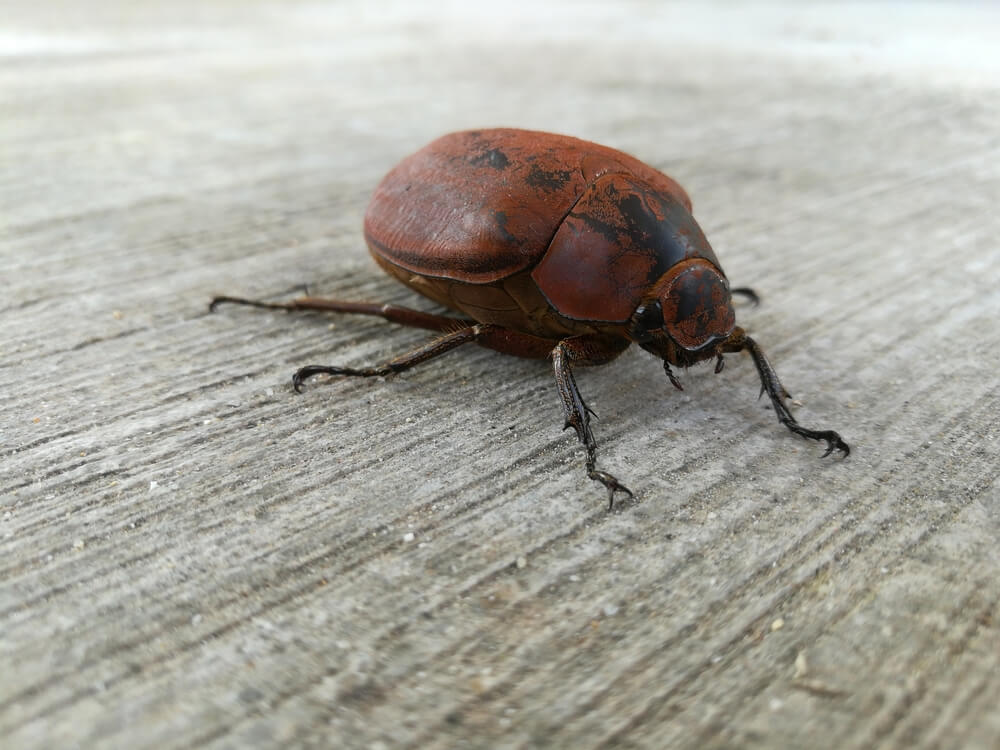
June bugs, also known as June beetles or May bugs, are scarab beetles that are commonly found on the east coast during the early to mid-summer, which is where they get their name from. June bugs are much larger than the average beetle found in New England, as they are typically ½” to 1” long. These beetles are reddish-brown with fat, oval shaped bodies and six legs. There are nearly 300 species of June bugs, but the most prevalent are the common June bug and the green June beetle.
Are June Bugs Harmful?
While June bugs do not bite and will very rarely infest homes, they can be harmful to the plants around your home and in your garden. While adult June bugs can damage plants by feeding on their leaves, they are most harmful when they are in their larvae stage. Adult June bugs lay their eggs in the soil, and the larvae that hatch out of these eggs are called white grubs. White grubs feed on the roots of grass and garden plants, which cuts off the plants ability to absorb nutrients, quickly killing them. To make matters worse, June bug larvae attract moles and other subterranean rodents, which can also eat crops and damage yards & gardens.
How Can I Prevent June Bugs?
There are a few different signs that can point to a June bug problem around your home:
- June bug sightings
- Patches of dead, brown grass around your lawn
- Ragged holes in plant leaves
- Noticing an influx in mole populations
- Small holes appearing in your lawn
If you notice any of these signs in May, June, or early July, there is a good chance that you have a June bug problem around your home! The good news is that there are a few different ways to prevent June bug infestations:
- Reduce fertilizer & chemical use on your plants, which will increase the number of natural predators that kill June bug larvae.
- Attract birds to your home with bird feeders and bird baths. These birds will eat adult June bugs, and some species will eat the white grubs out of the ground.
- Remove debris and dead grass from your lawn, which will help nutrients, air, and water reach the soil and can help reduce white grub populations.
- Hire a pest control professional to treat your lawn.
Contact Absolut Pest Control!
If you have any questions about June bugs or believe that you have a pest problem in or around your Massachusetts or New Hampshire home, contact Absolut Pest Control! We provide various pest removal services at affordable prices throughout the region! Contact us today by giving us a call at (978) 388-4589 or by filling out the contact form on our website!
Tips On Dealing With Horse Flies This Summer
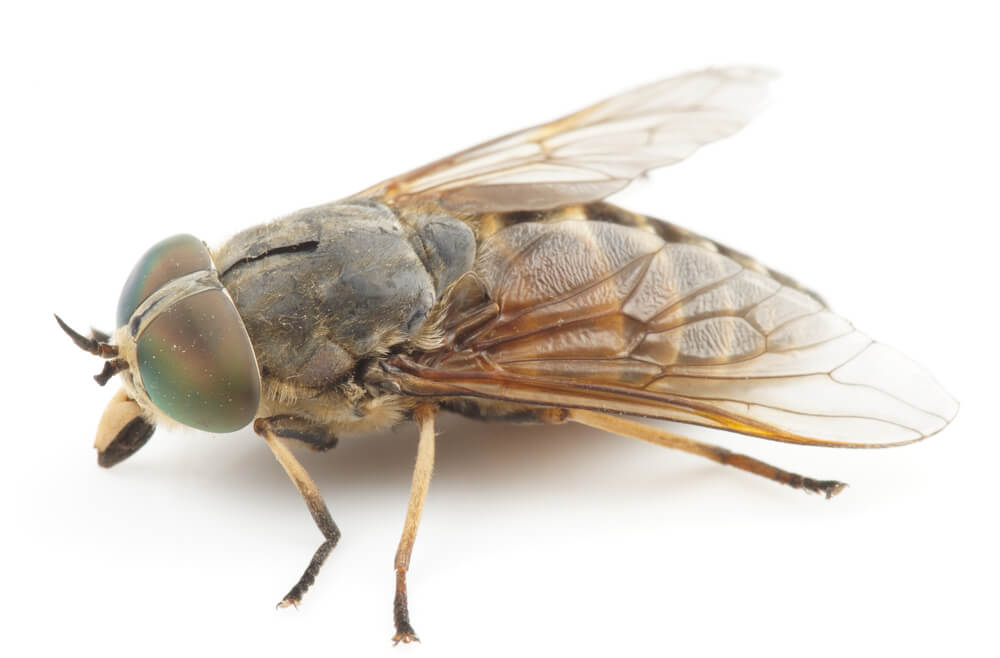
As the warmer weather approaches here in New England, so do the pests that come with it, like mosquitoes, ticks, yellowjackets, hornets, ants, and perhaps the most annoying of all, horse flies. Horse flies are larger than average house flies, usually with lengths of around ½” to 1 ¼”. Female horse flies feed on human & animal blood, and they have blade-like mouthparts that tear the skin, and unlike mosquitos, horse flies do not release any anesthetic when they bite, making the bites extremely painful. Horse flies are relentless and will continue to attempt to bite you until they either do so or have been killed. Horse flies are not known to be vectors of disease, but their bites can cause allergic reactions, itchiness, and swelling.
How To Prevent Horse Flies From Frequenting Your Property
If you’ve noticed an influx of horse flies around your home, there are a few things you can do to try to get rid of them, or at least limit their numbers. Horse flies love to hang out around hot, damp areas like streams and ponds, but long grass and weedy areas can also produce enough humidity to attract them. For this reason, maintaining a well-kept yard by mowing and weeding regularly is a great way to limit the number of horse flies around your house. Horse flies, and most other fly species, are also attracted to garbage, so it’s important that your outdoor trash bins are well-sealed with a snug fitting lid. One more way to keep your outdoor space horse fly-free is to burn citronella candles or tiki torches. The smoke and smell that citronella oil produces repels horse flies, mosquitos, and other insects, making these candles and tiki torches great for backyard barbecues and other outdoor activities. If you are facing a serious problem with horse flies, your best bet is to consult a pest control specialist who can professionally treat your property with insect repellents!
Contact Absolut Pest Control!
If you have any questions about pest control this summer or believe that you have a pest problem at your Massachusetts or New Hampshire home, contact Absolut Pest Control! We provide various insect extermination and pest removal services at affordable prices throughout the region! Contact us today by giving us a call at (978) 388-4589 or by filling out the contact form on our website!
Pest Control Tips For Fall ‘22

October is here, which means the cool fall weather is upon us, and winter is soon to come. In the pest control industry, the transition from warm to cold weather means that all kinds of pests will have behavioral changes, many of which surround the fact that creatures of all shapes and sizes will be looking for a warm place to wait out the winter. More often than not, this means that these pests will be looking to take up residence in your home or building, especially in climates like New England with harsh seasons. In this article, we’ll give you some tips on how you can keep your home pest-free this autumn!
Pest-Proof Your Home
One of the most effective ways to keep unwanted pests out of your home in the fall is to pest-proof your house or building. A great way to get started is by installing screens in your attic vents, chimney openings, and other gaps that animals may be able to get through. For holes and cracks that are too small for screens, you can use caulk or steel wool to seal them up. Additionally, you should replace weather-stripping and loose mortar around your home’s foundation and windows. Pest-proofing your home in this way can help prevent mice, rats, squirrels, birds, bats, and other animals from entering your home as the weather starts to get colder.
Proper Food Storage
Another great way to prevent pest problems this fall is to store all your food properly. Be sure that all dry goods (like oatmeal, flour, grains, and any other food that might be stored in cabinets or pantries) are stored in air-tight containers. Other than the reason for escaping the cold weather, pests also enter homes in search of food and water that can satiate them while their other food sources are scarce.
Keep Your Home Dry & Ventilated
One more tip for keeping pests away from your home this fall is to keep your basement, attic, and crawl spaces well-ventilated and dry. Leaks and water buildup from rain and melted snow can attract all kinds of pests, so it’s essential to be vigilant about keeping these areas of your home in good condition. Additionally, you should repair or install new gutters to help draw water and moisture away from your home, which can further prevent leaks and moisture buildup.
Contact Absolut Pest Control!
If you have any questions about pest control this fall or believe that you have a pest problem in your Massachusetts or New Hampshire home, contact Absolut Pest Control! We provide various pest removal services at affordable prices throughout the region! Contact us today by giving us a call at (978) 388-4589 or by filling out the contact form on our website!
Summer Pest Control Tips: Dealing With Raccoons On Your Property
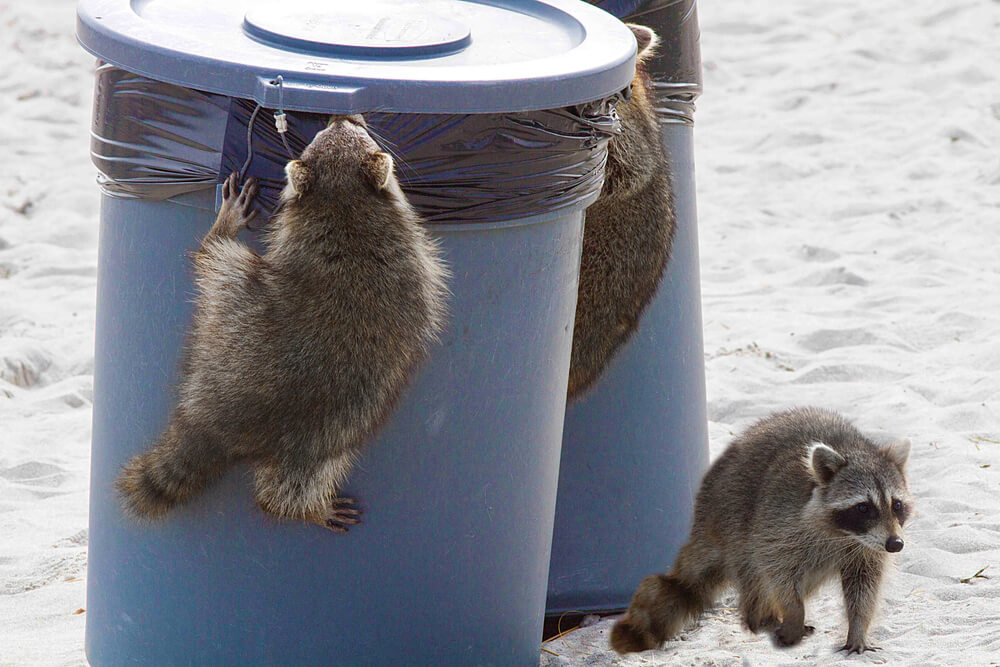
Here in New England, raccoons are a common problem in the summertime, whether you live in a city or a rural area. This is because raccoons can thrive in areas with livestock and abundant water sources, as well as in urban areas where they have access to trash and other resources. Raccoons, while sometimes cute looking, can be extremely dangerous when it comes to spreading diseases like rabies, canine distemper, and much more. According to the CDC, raccoons are the second most common animal to be found with rabies (after bats), and rabid raccoons can be found all along the east coast. In this article, we’ll discuss some tips on how you can prevent raccoons from frequenting your property and spreading disease to you, your family, and your pets.
Preventing Raccoons On Your Property
Raccoons are nocturnal animals, meaning they are typically only active at nighttime. For this reason, signs of raccoons are often noticed before actually seeing them. Signs of raccoon activity include droppings, tracks, unusual sounds, and trash that has been dug through overnight. If you believe raccoons are terrorizing your property, the best course of action is to contact a pest control professional right away. Because of these animals’ high rate of disease, attempting to deal with them on your own can be extremely dangerous.
There are some steps you can take to prevent raccoons from frequenting your property in the first place. Some of these steps include:
- Ensuring garbage is properly sealed with tightly fitting lids.
- Removing bird feeders and fountains altogether or monitoring them closely.
- Removing anything from the surrounding area of your home that could act as a hiding place or home for raccoons, including brush or leaf piles and firewood stacks.
Raccoons can also make their way into your home through small entryways like cracked vents, uncapped chimneys, and any other entrance leading inside from the outdoors. Raccoons and other pests have also been known to access homes by getting on the roof using tree limbs, so you should cut back any branches that are within 8 feet of your home.
Contact Absolut Pest Control!
If you have any questions about raccoon control or believe that you have a raccoon problem on your Massachusetts or New Hampshire property, contact Absolut Pest Control! We provide a wide variety of pest removal services at affordable prices throughout the region! Contact us today by giving us a call at (978) 388-4589 or by filling out the contact form on our website!
Pest Control Tips For Spring 2022

Days are becoming warmer here in New England and April is almost here, meaning it’s a great time to start preparing your home for springtime pests! Being proactive about preventing pests now can save you tons of time and effort in a month or so when spring bugs and wildlife begin to infringe on your property. In this article, we’ll go over some things you can do around your home and yard to prevent pests before they have the chance to “bug” you!
Seal Cracks & Holes Around Your Home
After a long New England winter, small cracks and holes can appear around your home’s entryways and foundation, caused by ice & snow or just general wear & tear. These cracks can act like little doors into your home for not only insects, but also small rodents and other pests. For example, a mouse can fit through a hole that’s only the size of a dime and may enter your home in search of food, water, and shelter. You can easily seal these cracks & holes that lead into your home with caulk, making it a cost-effective way to prevent pests this spring.
Use Window Screens
Similar to the above tip, make sure to use window screens when the weather starts to get warmer and you want some fresh air in your house. Having an open window without a screen is like an open invite for insects and other flying creatures to enter your home! If you don’t have window screens, now is a great time to install them while the bugs of New England are at bay!
Get Rid Of Standing Water
If there’s one tip that you take away from this article, it should probably be this: remove any standing water from your property. Standing water, or water that isn’t constantly flowing, can quickly become a breeding ground for mosquitoes and other insects, allowing them to quickly multiply on your property. Standing water is commonly found in gutters, wheelbarrows, buckets, and anywhere else rain can accumulate. Being proactive and moving these sources of potential standing water now can save you a serious headache when mosquito breeding season comes around!
Properly Store Food
One more tip to get you ready for springtime pests is to always properly store your food. This includes your trash, garden, and even the snacks in your pantry. Be sure to keep your garbage in barrels with lids, put a fence around your garden, and seal your food in air-tight containers. By storing your food correctly, you’ll prevent pests from venturing onto your property in search of food sources!
Contact Absolut Pest Control!
If you’re having a pest problem in Eastern Massachusetts or Southern New Hampshire, Absolut Pest Control is here to help! We provide the region with pest control & removal services for a wide variety of pests, including insects, rodents, bats, birds, termites, small mammals, and much more. Give us a call today at (978) 388-4589 or fill out the contact form on our website, and we’ll get back to you as soon as possible!
Tips On Getting Stink Bugs Out Of Your Home
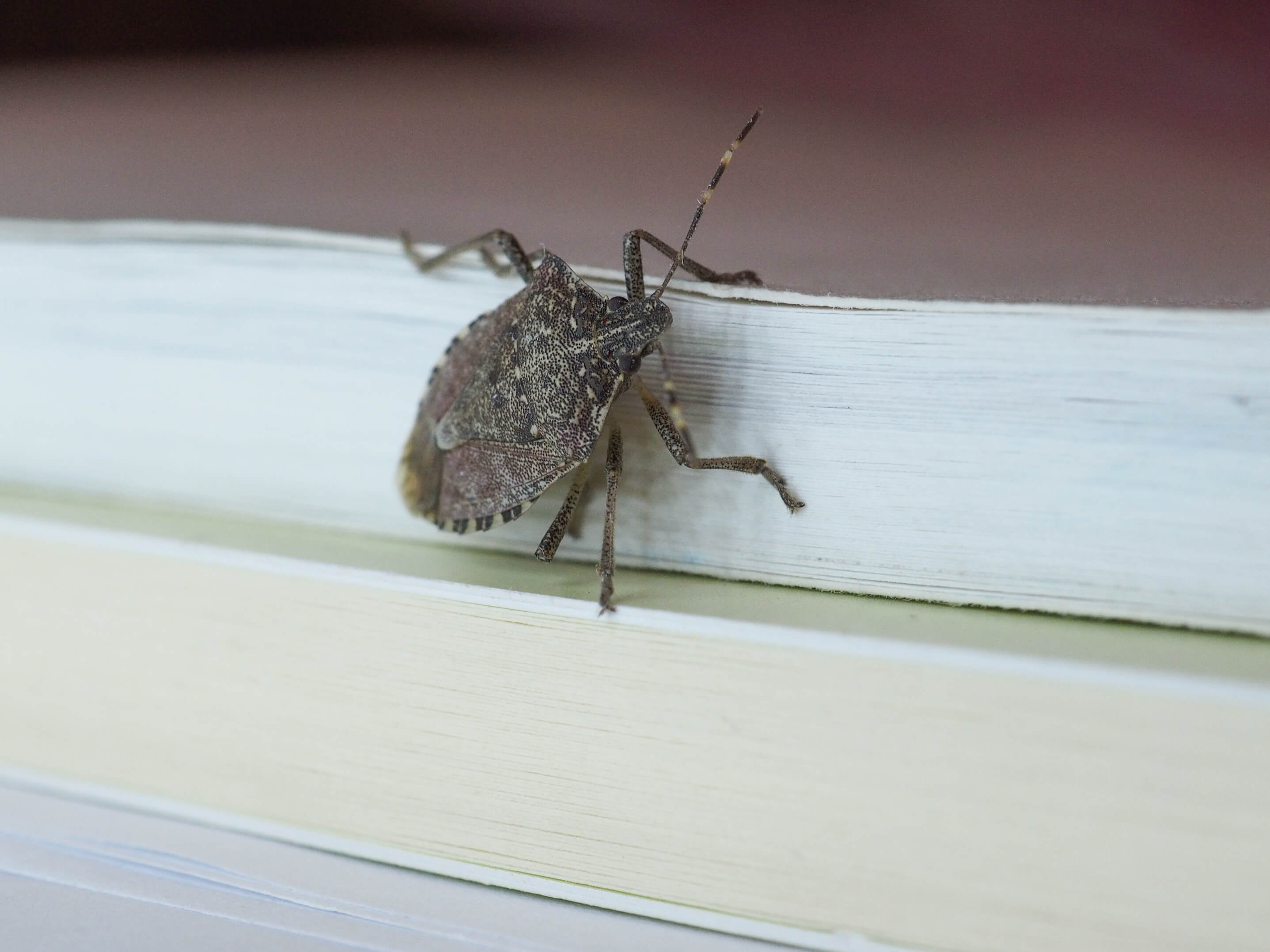
Brown Marmorated Stink Bugs – more commonly known as just stink bugs – are native to eastern Asia but were unknowingly introduced into the United States ecosystem at some point in the mid-1990s. Stink bugs often begin to creep into homes in Massachusetts when the weather starts to get chillier in the fall and early winter. Stink bugs can be seriously annoying because they reproduce quickly and can seemingly appear in your home out of nowhere. Stink bugs also give off a foul smell when they’re killed, hence their name. For this reason, you may want to consider removing them from your home with alternate strategies. Absolut Pest Control provides southern New Hampshire and greater Boston with professional pest control services, including stink bug removal and prevention!
How To Remove Stink Bugs From Your House
While stink bugs can be an extreme annoyance because of the odor they give off, the good news is that they’re relatively easy to catch. Stink bugs fly rather quickly, but when crawling, they’re quite slow. If you notice one or many stink bugs inside your home, avoid touching or squishing them because they give off a terrible smell when they die. Instead, grab them gently with a plastic bag or trap them in a cup, then take them outside to dispose of them or set them free. If you notice them on the floor or on a carpet, you can vacuum them up, then empty your vacuum cleaner into an outdoor trash can. However, like with most pests, the best way to get rid of all your stink bugs and make sure they’re gone for good is to hire a pest control professional!
How To Prevent Stink Bugs From Getting Inside Your Home
Once you’ve gotten rid of the stink bugs that were already inside your home, it’s essential to prevent more from coming in. One way you can prevent stink bugs from entering your home is by going around the exterior of your house and sealing up any cracks in your screens, windows, and siding. Another strategy for preventing stink bugs is to coat your home’s entryways in an odor-free insect repellent. As always, if you’re worried about stink bugs or any other bugs entering your home, you should hire a pest control professional who will get the job done right!
Contact Absolut Pest Control!
If you have any questions about our pest control services or need pest control at your home, please don’t hesitate to contact us! Give us a call at (978) 388-4589 or fill out the contact form on our website, and we’ll get back to you as soon as possible!
3 Pests That Are Common In The Fall

As the colder weather approaches New England, critters and pests begin looking for a warm place to stay for the winter. This article will go over some common pests that people often have problems with in the fall months.
Mice
Like many rodents, mice begin searching for food and warmth when the cold New England weather starts in the fall. Because of this, your home may seem like an attractive place for them to shack up in the fall and winter. The best way to prevent this is by being proactive and making sure to seal off any potential entry points like tiny holes in doors or screens, air vents, gaps around plumbing, and any other small holes that lead into your house. You may also consider setting some preventative mouse traps so you can catch them if they do somehow make their way into your home.
Spiders
Fall is the time of year when some species of spiders begin laying their eggs before their life comes to an end, which can increase the population and bring the creepy crawlers into your home. While New England doesn’t have many dangerous spider species, it’s still a good idea to call a pest control professional if you have a spider infestation because they can deal with the problem effectively and make sure that the infestation does not persist. If you see spiders or spider webs outside your home, it’s important to remember that spiders are a crucial part of our ecosystem because they control the population of other bugs.
Beetles
You may begin to see beetles in your home in the fall months because this is around the time that these insects look for a safe place to hibernate for the winter. Some of the most common New England beetles that people have issues with at this time of year are ladybugs and stink bugs. These beetles often congregate around warm areas, so keep an eye out for them near any heat source. When you see beetles, an effective way to get rid of them is by vacuuming them up. Be sure to close off windows and holes in screens so these beetles don’t have an easy entry point into your home.
Contact Absolut Pest Control!
If you have any more questions about autumn pests or have a pest control problem in the greater Boston or southern New Hampshire area, don’t hesitate to contact us! Give us a call at (978) 388-4589, or fill out the contact form on our website!
Winter Pest Control Tips
It is December in New England. We have a few snowfalls, families are getting ready for the holiday season, and if you have made it this far without turning your heat on you are a true New Englander. As it continues to get colder and colder outside of your home, pests and especially rodents will be looking for any home to make their own for the next few months. Compared to finding shelter in the wilderness, your home or commercial property is very preferred. There is heat, access to food, and cable. Although they probably don’t care about that last one. Regardless, you will want to do whatever you can to keep pests and rodents from entering your home and setting up camp.
Preventing Mice & Rats From Eating Your Food This Winter
The goal of preventing rodents from entering your home this winter is to make sure you do whatever you can to not make your home appealing to them in the first place. That doesn’t mean not having your heat on. Instead, you need to do whatever you can to keep food out of their hands. First off we recommend storing all of your food in airtight plastic containers. Trash should not be left uncovered and should be taken out frequently to avoid attracting rats, mice, or raccoons. And of course, you should periodically clean your kitchen and bedrooms with vacuum cleaners to collect food crumbs and debris.
Schedule A Winter Pest Control Inspection
Another important tactic for winter pest control is to have professionals survey your property. If you have had issues with rodents in the past, you should hire a pest control team to get to the bottom of how they are getting into your home. Pest Control experts know where to look and what to look for to find entry points. With some simple carpentry, you can limit the ease of entrance for pests coming into your home.
What To Do When You See Pests In Your Home
If there is a rodent in your home, do not rely on store-bought traps. Many of those traps can be ineffective and cleaning up after them can be a hassle. Instead, hire a pest control team to remove the rodents and find the issues that led to the infestation in the first place. Simply getting rid of one rodent at a time is not an effective way to deal with rodents longterm.
Contact Absolut Pest Control
For homes and businesses throughout Eastern Massachusetts, there is one name in Pest Control everyone trusts: Absolut Pest Control. Give us a call to discuss a pest control inspection or the removal of a rodent or other issue.
Tips For Dealing With Raccoons
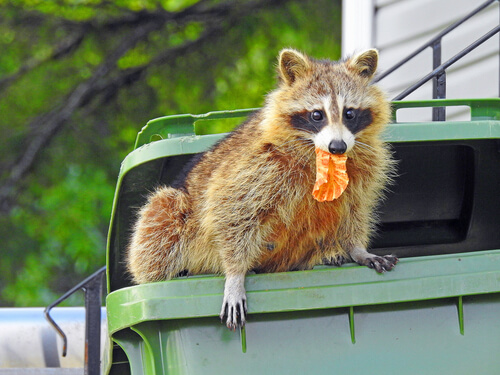
At best raccoons can be an annoying nuisance: getting into the trash, destroying patio furniture, or harassing outdoor pets. At worst, a raccoon can get stuck in your home and nest, and attack members of your family and destroy parts of your home. Getting rid of raccoons can be a hassle and although there are DIY methods for raccoon control, it is always recommended that you contact a local pest control professional. But before you worry about raccoons, there are a few ways to prevent a raccoon problem in the first place.
Keep Raccoons Out Of The Home
When it comes to raccoons, it is preferred that they stay outdoors. Raccoons like to nest, especially in colder months. Because of that, it is important to limit the possibility of raccoons getting into your home. Luckily, raccoons are much larger than rodents or insects, This means it is unlikely that they will be able to enter your home through the same small holes that other pests do. Raccoons generally try to get into attics and basements. To avoid this make sure all windows and doorways are secure. Be aware of tree branches that can make it easy for raccoons to get to the roof. Generally, your tree branches should end five feet away from the home. Make sure your chimney has a cover and screen to protect it from raccoon invasion.
Do Not Provide Food To Raccoons
The most likely reason you have a raccoon problem is that you (or your neighbor) makes it easy for raccoons to get a meal on your property. Although it can be tempting to put your trash out the night before garbage day, waking up early to take the trash out can prevent raccoons from moving to your property. Limiting food options outdoors will decrease the chances of raccoons. That is why it is also important to make sure any outdoor eating areas on porches, decks, and patios, are properly cleaned after use.
Do Not Expect A Dog To Deter Raccoons
There is an unfortunate myth that having outdoor dogs will prevent raccoons. Although it is true that some breeds of dogs are able to protect your property better than others, raccoons will fight with dogs and you do not want your bet to get injured. Cats may be good options to get rid of mice, but that is because cats have distinct physically advantages, raccoons can terribly injure your pets.
Call Pest Control
If you see raccoons on your property, do not wait, call Absolut Pest Control. Our team has decades of experience removing rodents and other pests from properties. We can remove raccoons from your attics, basements, lawns, and other areas of your property. Give us a call today or contact us online.
